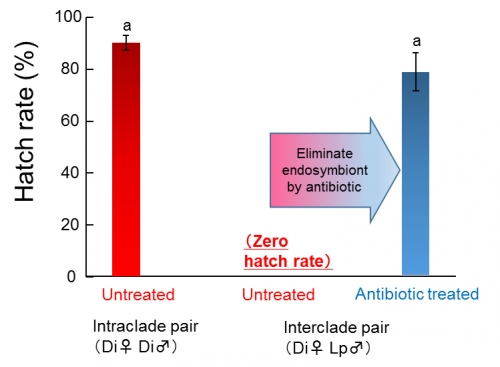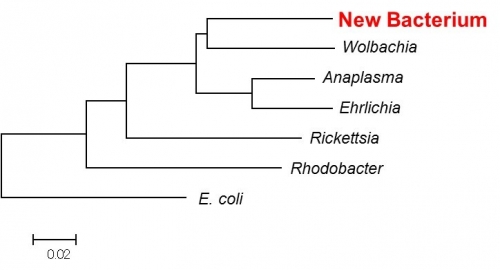研究成果 Research Results
- TOP
- News
- Research Results
- Discovery of new bacterial endosymbiont that manipulates reproduction of a host insect
Discovery of new bacterial endosymbiont that manipulates reproduction of a host insect
2017.05.23Research ResultsLife & Health
Bacterial endosymbionts which infect arthropods are known to manipulate reproduction of insect hosts in order for their own propagation. Infected females can produce offspring by mating with both infected and uninfected males, but uninfected females cannot or seldom produce offspring with infected males. This phenomenon is called Cytoplasmic incompatibility (CI). Two bacterial endosymbionts are known as CI inducers: Wolbachia and Cardinium. And previous studies have found that only Wolbachia induces complete CI where 100 % mortality occurs in incompatible crosses. The research group of Assistant Prof.Takano investigated the coconut beetle, a serious invasive pest of coconut palms, and reported a third CI and the world’s second complete CI inducer that belongs to a novel clade of Alphaproteobacteria. This bacterial endosymbiont caused complete CI between two clades of the coconut beetle. This newly discovered bacterium has potential to be used as a biological control agent and contributes to reveal the mechanisms of speciation of the host insects.
For more information about this research, see
PNAS, Takano et al." Unique clade of alphaproteobacterial endosymbionts induces complete
cytoplasmic incompatibility in the coconut beetle" published online on 22 May, 2017 in US ET. (DOI: 10.1073/pnas.1618094114)

Fig. 1.
Crossing tests among two populations (Di and Lp) in the absence or presence of antibiotic treatment in the coconut beetle (modified from Takano et al. 2017).

Fig. 2.
Phylogenetic tree of the novel clade of alphaproteobacterial endosymbionts detected in the coconut beetle (modified from Takano et al. 2017)
Journal Reference
Unique clade of alphaproteobacterial endosymbionts induces complete cytoplasmic incompatibility in the coconut beetle, ,PNAS, 10.1073/pnas.1618094114Research-related inquiries
- TOP
- News
- Research Results
- Discovery of new bacterial endosymbiont that manipulates reproduction of a host insect































